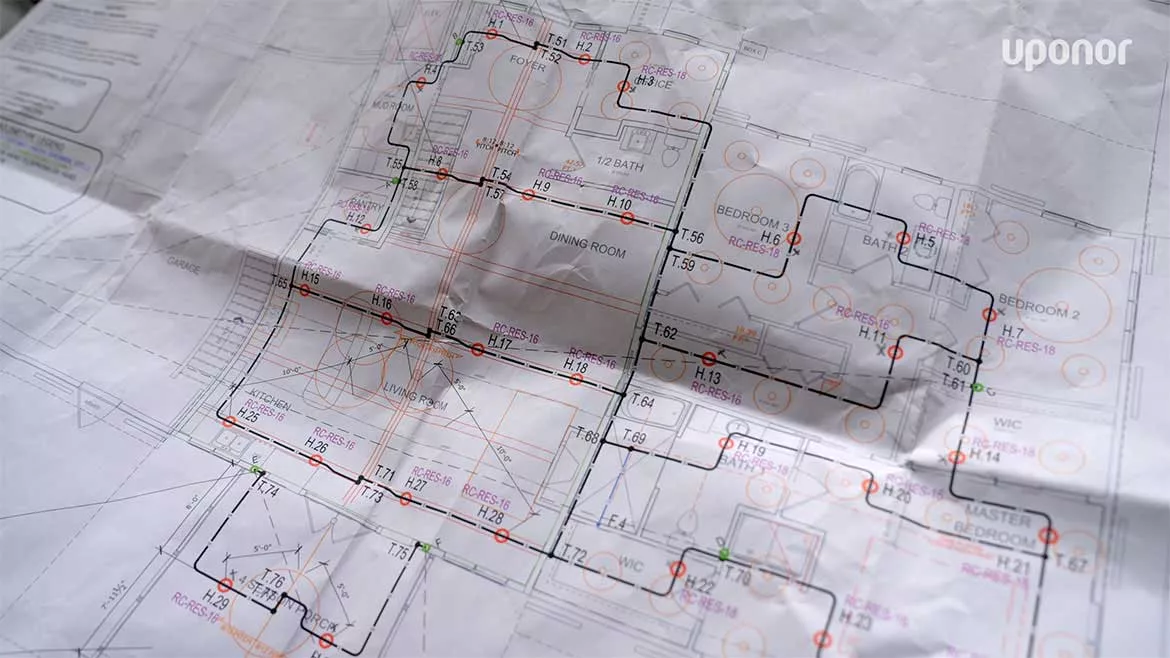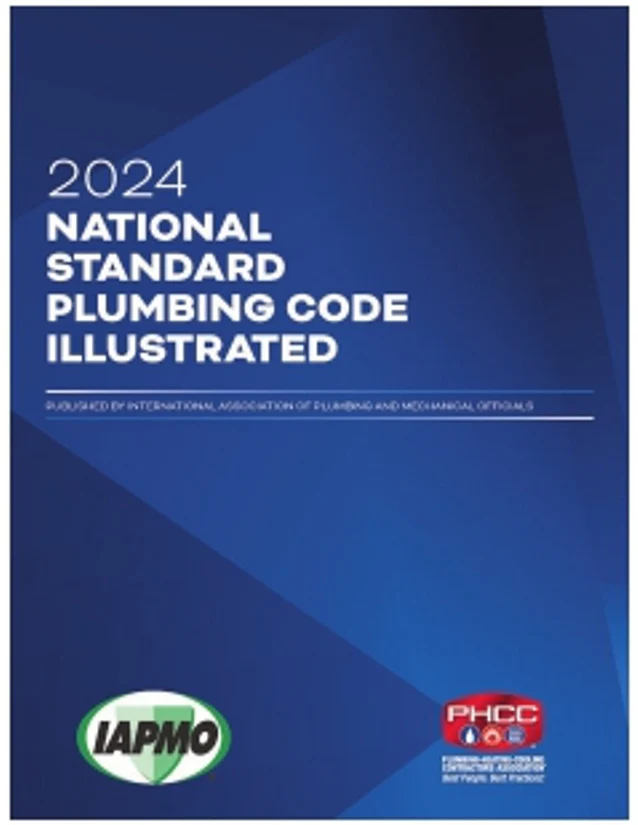Former firefighter designs new home with multipurpose plumbing and fire sprinkler system
Licensed plumbers can be trained and permitted to install an AquaSAFE fire sprinkler system.

To support the growing demand for fire safety contractor training, Uponor North America revamped the former AquaSAFE Level I classroom and Level II job-site training into one comprehensive, online qualification program via Uponor Academy Online. The training, which focuses on the NFPA 13D standard for installations in one- and two-family homes, is available on-demand to meet the needs of busy professionals in today’s home construction market. Photo is courtesy of GF Building Flow Solutions, formerly Uponor.
Years ago, Jesse Faust became a firefighter and an EMT (emergency medical technician) for much the same reason that motivates so many first responders — he wanted to help people.
Then, in the summer of 2022, the unthinkable happened. Faust was involved in a severe car accident that left him partially paralyzed and forced him into disability retirement. While the accident ended his firefighting career, it did not stifle his passion for educating the public about the critical need to maximize fire safety for their homes and, more importantly, for their families.
Through his many years of service, Faust saw firsthand the devastation fire can inflict on structures of all types and sizes. So, when the family decided to design and build a new home near Madison, Wisconsin, to accommodate Faust’s needs, fire sprinklers were top of mind.
“Sprinkler systems are great,” Faust comments, recalling his encounters with them in various commercial buildings. “They really confine a fire and keep it from spreading.”
And what works in commercial structures applies equally well in a residential space like the Faust’s new 5,500-square-foot home. “The benefit of having a sprinkler system in my house is, again, the ability to confine a fire to a smaller space so you may not lose your whole house.”

Uponor AquaSAFE residential fire sprinkler systems are a life-saving upgrade to any home. Available as a multipurpose combined plumbing and fire sprinkler system or a standalone system, AquaSAFE uses the same flexible PEX piping and ProPEX fittings that plumbers have relied on for decades, the company says. Photo courtesy of GF Building Flow Solutions, formerly Uponor

Smoke alarms, while still an important part of fire safety, cannot provide the same high-level of critical, life-saving protection as fire sprinklers. Photo courtesy of GF Building Flow Solutions, formerly Uponor
Why smoke alarms are not enough
Bill Sullivan serves as fire marshal for the City of Madison and chairperson of the Wisconsin Fire Sprinkler Coalition, an organization dedicated to breaking down barriers and educating communities about residential fire sprinkler systems.
With more than 30 years in fire safety, Sullivan is well aware that relatively few areas in Wisconsin as well as across the United States have code requirements or mandates for fire sprinklers in new or existing homes.
Of course, many American homes do have smoke alarms for protection against fire, and Sullivan believes these familiar household devices are “still an important part of fire safety.” Even so, they cannot provide the same high level of critical, life-saving protection as fire sprinklers.
“Smoke alarms are passive, and humans still have to react to that sound,” he explains. “Smoke alarms do not do anything if nobody's home at the time. And if people or pets are in the house but unable to get out on their own and need assistance, the smoke alarm does not help.”
On the other hand, fire sprinklers are active systems that respond directly to extreme heat. “The fire sprinkler system is going to react and begin to flow water as soon as the temperature reaches a certain level at the sprinkler head,” states Sullivan. “The sprinkler begins to put water on the fire to control it and potentially put it out — long before anybody has time to call 911 and for the fire department to respond.”
Faust can relate to concerns about people and pets unable to escape a fire on their own. “Being that I'm handicapped, and I don't get around that well, fire sprinklers make a huge difference,” he says. “If I happen to not be in my wheelchair, I'm kind of confined to whatever particular space I'm in. So, really, sprinklers are almost a lifesaver for me.”
Fire sprinklers: worth considering
In 2023, there were 2,160 reported home fire fatalities throughout the United States, according to FEMA, including 47 in Wisconsin. This is why the Wisconsin Fire Sprinkler Coalition and Sullivan work to show plumbers how they can easily add sprinklers to their service offerings.
The other equally important task involves educating a sometimes skeptical public about the benefits of installing a multipurpose fire sprinkler system that combines with the home’s cold-water plumbing.
“The first step is just to consider it,” he remarks. “And when homebuyers actually talk to their builders and suppliers, they can see what it would really cost in their particular situation.”
And every building situation is unique. For example, the Faust home is on well water, so they needed to add an extra pump in the tank. But that cost may not be a requirement for homes on a city water supply.

Through his many years of service, Faust saw firsthand the devastation fire can inflict on structures of all types and sizes. So, when the family decided to design and build a new home near Madison, Wisconsin, to accommodate Faust’s needs, fire sprinklers were top of mind. Photo courtesy of GF Building Flow Solutions, formerly Uponor

To prepare for the Faust home installation, the Van Den Bergh Plumbing team underwent four hours of online training through Uponor. Photo courtesy of GF Building Flow Solutions, formerly Uponor
What are the requirements for installing a multipurpose system?
Louie Van Den Bergh, a licensed plumber and owner of Van Den Bergh Plumbing in Mazomanie, Wisconsin, is a 24-year industry veteran who uses PEX pipe “in every home we help build or remodel.”
However, the Faust residence marked his first time installing a PEX multipurpose system — or any home fire sprinkler system for that matter.
To prepare, Van Den Bergh’s team underwent four hours of online training through Uponor, the AquaSAFE multipurpose system provider. “You just follow along and take a test at the end of each training section,” he explains. “It was pretty easy.”
The manufacturer’s rep, Bill Panfil from Midwest Sales and Marketing, was on site to help Van Den Bergh lay out the project while offering helpful pointers and additional training.
“I’m there to answer any questions that might come up,” Panfil says, “and to ensure the installation goes smoothly.”
Which it did, reports Van Den Bergh: his first time installing home fire sprinklers “was a learning experience,” he admits. “But it did go really smoothly once we got everything figured out.”
The multipurpose system incorporates the sprinkler heads into the home’s cold-water supply lines. As a result, the same PEX pipe and expansion fittings are used throughout the residence. The sprinkler head essentially becomes another plumbing fixture in the water supply line. Whenever someone in the home turns on a faucet or flushes a toilet, it confirms the fire sprinkler system is also operational.
“It is a live system that is always moving fresh water through the home,” Panfil explains. “It uses the same pipe and connection system, so everything works flawlessly together.”
This is why a licensed plumber like Van Den Bergh can be trained and permitted to install the system rather than requiring the builder to hire a separate fire sprinkler specialist (which is the case with commercial projects).

The multipurpose AquaSafe system incorporates the sprinkler heads into the home’s cold-water supply lines. The same PEX pipe and expansion fittings are used throughout the Faust residence. Photo courtesy of GF Building Flow Solutions, formerly Uponor

The sprinkler head essentially becomes another plumbing fixture in the water supply line. Whenever someone in the home turns on a faucet or flushes a toilet, it confirms the fire sprinkler system is also operational. Photo courtesy of GF Building Flow Solutions, formerly Uponor
“It’s just a nice, clean, easy install,” Panfil says. “One contractor does it all.”
Following this first home fire sprinkler project, Van Den Bergh has a simple enough message for other plumbing installers.
“Don’t be afraid of it,” he says. “We were able to plumb the whole house and go back through and tie a couple of the fixtures into the sprinkler system easily.”
The multipurpose system in the Faust home is also covered by a 25-year PEX-a pipe and expansion fitting system warranty, offering added peace of mind to both Van Den Bergh and the Faust family.
“We have always heard Uponor has a really good warranty and stands behind their product,” he says. “We have never had to use that warranty, so that’s a good thing. But we feel comfortable that if we did need it, they would take care of us.”

The multipurpose system in the Faust home is also covered by a 25-year PEX-a pipe and expansion fitting system warranty, offering added peace of mind to both Van Den Bergh and the Faust family. Photo courtesy of GF Building Flow Solutions, formerly Uponor

Every building situation is unique. For example, the Faust home is on well water, so they needed to add an extra pump in the tank. But that cost may not be a requirement for homes on a city water supply. Photo courtesy of GF Building Flow Solutions, formerly Uponor
Having found success on the Faust project, Van Den Bergh is receptive to working with home fire sprinklers again. “It opens our doors a little bit more to doing it in the future,” he says. “At least we have the confidence to move forward with it.”
Fire sprinklers for forever homes
A common misconception about fire sprinklers is that they might leak or accidentally activate, causing considerable damage to the home. Faust dismisses such concerns as badly overstated.
“Would a homeowner fear installing a new toilet or sink?” he asks. “This system is using the same plumbing that is already in my house, so I'm not concerned about it leaking, just like I'm not concerned about my sink leaking. The sprinkler head is essentially just another termination point in the home, so there’s no more risk of leaks than a faucet.”

In 2023, there were 2,160 reported home fire fatalities throughout the United States, according to FEMA, including 47 in Wisconsin. This is why the Wisconsin Fire Sprinkler Coalition and Bill Sullivan work to show plumbers how they can easily add sprinklers to their service offerings. Photo courtesy of GF Building Flow Solutions, formerly Uponor

A common misconception about fire sprinklers is that they might leak or accidentally activate, causing considerable damage to the home. Faust dismisses such concerns as badly overstated. Photo courtesy of GF Building Flow Solutions, formerly Uponor
And now, with more people choosing to age in place, it begs the question: How can homeowners sustain a high level of comfort and safety as their mobility inevitably declines over time? As Faust can attest, unfortunately, such changes can come swiftly without warning.
“People have to think about the future if they're building a house,” he says. “Today, you may be able to get out of your home easily. But in the future, maybe not.”
Faust admits that, as an active firefighter, he never seriously considered fire sprinklers a safety option for the home. “But here I am, just extremely fortunate to have this protection to show it to others so that they realize what’s possible.”
His recommendation? “If you have the means and are considering installing sprinklers, you should do it.”
Looking for a reprint of this article?
From high-res PDFs to custom plaques, order your copy today!






